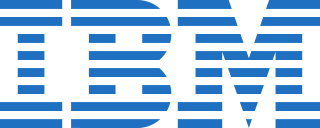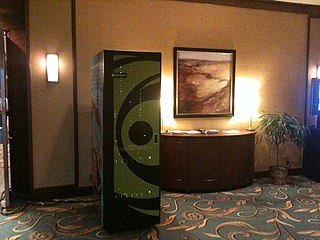
Ingres Database is a proprietary SQL relational database management system intended to support large commercial and government applications.

Db2 is a family of data management products, including database servers, developed by IBM. It initially supported the relational model, but was extended to support object–relational features and non-relational structures like JSON and XML. The brand name was originally styled as DB2 until 2017, when it changed to its present form.
Teradata Corporation is an American software company that provides cloud database and analytics-related software, products, and services. The company was formed in 1979 in Brentwood, California, as a collaboration between researchers at Caltech and Citibank's advanced technology group.
Quantum Corporation is a data storage, management, and protection company that provides technology to store, manage, archive, and protect video and unstructured data throughout the data life cycle. Their products are used by enterprises, media and entertainment companies, government agencies, big data companies, and life science organizations. Quantum is headquartered in San Jose, California and has offices around the world, supporting customers globally in addition to working with a network of distributors, VARs, DMRs, OEMs and other suppliers.

Dell EMC is an American multinational corporation headquartered in Hopkinton, Massachusetts, and Round Rock, Texas, and is a subsidiary of Dell Technologies. Dell EMC sells data storage, information security, virtualization, analytics, cloud computing and other products and services that enable organizations to store, manage, protect, and analyze data. Dell EMC's target markets include large companies and small- and medium-sized businesses across various vertical markets.
NetApp, Inc. is an American data infrastructure company that provides unified data storage, integrated data services, and cloud operations (CloudOps) solutions to enterprise customers. The company is based in Cork City, Ireland. It has ranked in the Fortune 500 from 2012 to 2021. Founded in 1992 with an initial public offering in 1995, NetApp offers cloud data services for management of applications and data both online and physically.
Business intelligence software is a type of application software designed to retrieve, analyze, transform and report data for business intelligence (BI). The applications generally read data that has been previously stored, often - though not necessarily - in a data warehouse or data mart.
SAP IQ is a column-based, petabyte scale, relational database software system used for business intelligence, data warehousing, and data marts. Produced by Sybase Inc., now an SAP company, its primary function is to analyze large amounts of data in a low-cost, highly available environment. SAP IQ is often credited with pioneering the commercialization of column-store technology.
FAME is a time series database released in 1981 and owned by FIS Global.
In computing, the term data warehouse appliance (DWA) was coined by Foster Hinshaw for a computer architecture for data warehouses (DW) specifically marketed for big data analysis and discovery that is simple to use and has a high performance for the workload. A DWA includes an integrated set of servers, storage, operating systems, and databases.
Microsoft SQL Server is a proprietary relational database management system developed by Microsoft. As a database server, it is a software product with the primary function of storing and retrieving data as requested by other software applications—which may run either on the same computer or on another computer across a network. Microsoft markets at least a dozen different editions of Microsoft SQL Server, aimed at different audiences and for workloads ranging from small single-machine applications to large Internet-facing applications with many concurrent users.

IBM Netezza is a subsidiary of American technology company IBM that designs and markets high-performance data warehouse appliances and advanced analytics applications for the most demanding analytic uses including enterprise data warehousing, business intelligence, predictive analytics and business continuity planning.
Aster Data Systems was a data management and analysis software company headquartered in San Carlos, California. It was founded in 2005 and acquired by Teradata in 2011.

Vertica is an analytic database management software company. Vertica was founded in 2005 by the database researcher Michael Stonebraker with Andrew Palmer as the founding CEO. Ralph Breslauer and Christopher P. Lynch served as CEOs later on.

Sensage Inc. is a privately held data warehouse software provider headquartered in Redwood City, California. Sensage serves enterprises who use the software to capture and store event data so that it can be consolidated, searched and analyzed to generate reports that detect fraud, analyze performance trends, and comply with government regulations.

Pentaho is the brand name for several Data Management software products that make up the Pentaho+ Data Platform. These include Pentaho Data Integration, Pentaho Business Analytics, Pentaho Data Catalog, and Pentaho Data Optimiser.
NetVault is a set of data protection software developed and supported by Quest Software. NetVault Backup is a backup and recovery software product. It can be used to protect data and software applications in physical and virtual environments from one central management interface. It supports many servers, application platforms, and protocols such as UNIX, Linux, Microsoft Windows, VMware, Microsoft Hyper-V, Oracle, Sybase, Microsoft SQL Server, NDMP, Oracle ACSLS, IBM DAS/ACI, Microsoft Exchange Server, DB2, and Teradata.

PureSystems is an IBM product line of factory pre-configured components and servers also being referred to as an "Expert Integrated System". The centrepiece of PureSystems is the IBM Flex System Manager in tandem with the so-called "Patterns of Expertise" for the automated configuration and management of PureSystems.

SAP HANA is an in-memory, column-oriented, relational database management system developed and marketed by SAP SE. Its primary function as the software running a database server is to store and retrieve data as requested by the applications. In addition, it performs advanced analytics and includes extract, transform, load (ETL) capabilities as well as an application server.
Actian is an American software company headquartered in Santa Clara, California that provides analytics-related software, products, and services. The company sells database software and technology, cloud engineered systems, and data integration solutions.









